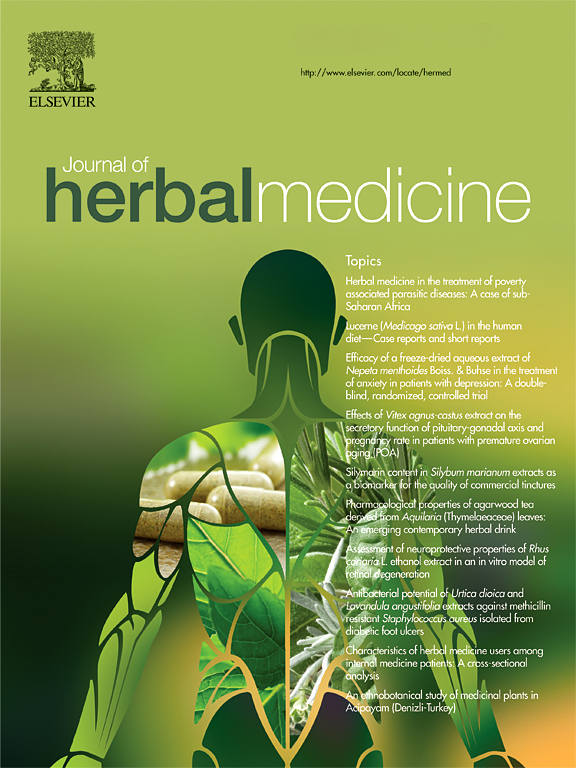Exploring the therapeutic potential of Polygonum aviculare L. compounds against Dengue virus through Computational methods
IF 1.9
4区 医学
Q2 INTEGRATIVE & COMPLEMENTARY MEDICINE
引用次数: 0
Abstract
Introduction
The dengue virus, commonly referred to as DENV, is the primary cause of dengue fever and is a serious health concern worldwide, especially in tropical and subtropical regions. Since DENV's protease NS2B-NS3 is an enzyme necessary for viral transmission, antiviral medications have an adequate probability of being effective. Natural compounds derived from plants like Polygonum aviculare L. which is also commonly known as knot grass or prostate knotweed, have been recognised for their potential antiviral properties
Methods
Initially, the three-dimensional model of NS2B-NS3 protease and the .sdf format structures of knot grass compounds were retreived from PDB and ChEBI databases, respectively which were later proceeded for molecular docking analysis using MOE. The pharmacokinetic analysis was done by utilizing ADMETlab ver. 2.0 and SwissADME servers whereas, the iMODS server was incoporated to evaluate the structural stability and flexibility of the docked complex.
Results
The results of docking analysis revealed significant interactions between knot grass compounds and the NS2B-NS3 protease. The selection of a potential drug candidate from the incorporated compounds was made not merely on the basis of the docking scores but, their pharmacokinetic properties were also examined in this context. The combined results of both of these investigations i.e., docking and pharmacokinetics analysis suggested that (−)-epicatechin exhibited the most stable binding affinity (-5.6924 kcal/mol) and drug-likeness features. These significant outcomes indicated that this compound possessed the notable degrees of drug-likeness attributes. In the end, the structural stability and interaction dynamics of NS2B-NS3 protease-epicatechin docked complex were examined by incorporating the normal mode analysis and multi-scale simulations. The results indicated significant structural stability and flexibility of the complex under study by the evaluations of the elastic network model, eigenvalues, and bfactor maps, among others
Conclusion
On the basis of the outcomes of multi-dimensional computational analyses, it was proposed that (-)-epicatechin could be a potential drug candidate against DENV. However, the actual efficacy of this compound can only be evaluated in the wet-lab and clinical settings. The findings of this study provided a direction towards exploring the medicinal perspectives of various plants-based compounds in order to identify a potential drug against DENV.
利用计算方法探索蓼类化合物对登革病毒的治疗潜力
登革热病毒,通常被称为DENV,是登革热的主要病因,是全世界,特别是热带和亚热带地区严重的健康问题。由于DENV的蛋白酶NS2B-NS3是病毒传播所必需的酶,抗病毒药物有足够的可能性有效。方法首先从PDB和ChEBI数据库中分别获取NS2B-NS3蛋白酶的三维模型和结草化合物的。sdf格式结构,然后利用MOE进行分子对接分析。采用ADMETlab进行药代动力学分析。2.0和SwissADME服务器,而采用iMODS服务器来评估对接配合物的结构稳定性和灵活性。结果对接分析结果显示,结草化合物与NS2B-NS3蛋白酶之间存在显著的相互作用。从合并的化合物中选择潜在的候选药物不仅是基于对接分数,而且在这种情况下也检查了它们的药代动力学特性。对接和药代动力学分析表明(−)-表儿茶素具有最稳定的结合亲和力(-5.6924 kcal/mol)和药物相似性特征。这些显著的结果表明,该化合物具有显著程度的药物相似属性。最后,通过正态分析和多尺度模拟,考察了NS2B-NS3蛋白酶-表儿茶素对接物的结构稳定性和相互作用动力学。通过对弹性网络模型、特征值和b因子图等的评价,结果表明所研究的配合物具有明显的结构稳定性和柔韧性。结论基于多维计算分析的结果,提出(-)-表儿茶素可能是一种潜在的抗DENV的候选药物。然而,这种化合物的实际功效只能在湿实验室和临床环境中进行评估。本研究结果为探索各种植物基化合物的药用前景提供了方向,以确定潜在的抗DENV药物。
本文章由计算机程序翻译,如有差异,请以英文原文为准。
求助全文
约1分钟内获得全文
求助全文
来源期刊

Journal of Herbal Medicine
INTEGRATIVE & COMPLEMENTARY MEDICINE-
CiteScore
3.90
自引率
0.00%
发文量
94
期刊介绍:
The Journal of Herbal Medicine, the official journal of the National Institute of Medical Herbalists, is a peer reviewed journal which aims to serve its readers as an authoritative resource on the profession and practice of herbal medicine. The content areas of the journal reflect the interests of Medical Herbalists and other health professionals interested in the clinical and professional application of botanical medicines. The objective is to strengthen the research and educational base of herbal medicine with research papers in the form of case studies, original research articles and reviews, monographs, clinical trials and relevant in vitro studies. It also publishes policy statements, opinion pieces, book reviews, conference proceedings and profession related information such as pharmacovigilance reports providing an information source for not only the Herbal Practitioner but any Health professional with an interest in phytotherapy.
 求助内容:
求助内容: 应助结果提醒方式:
应助结果提醒方式:


